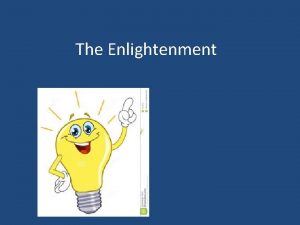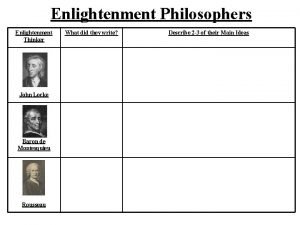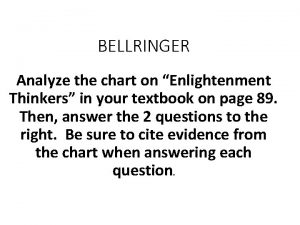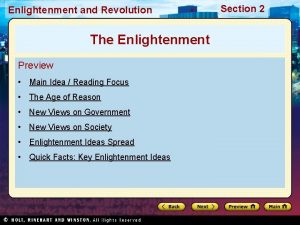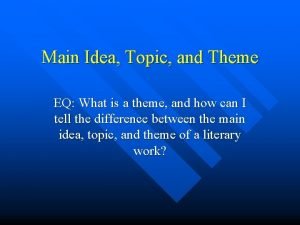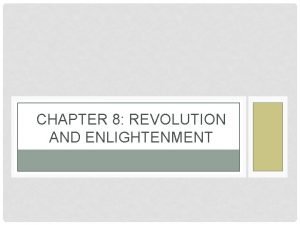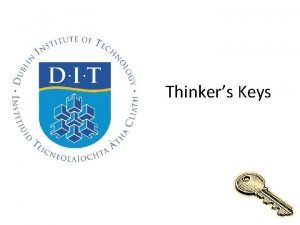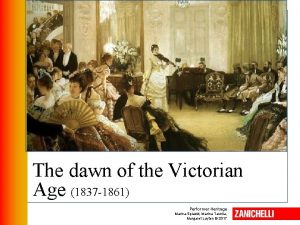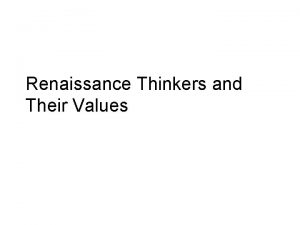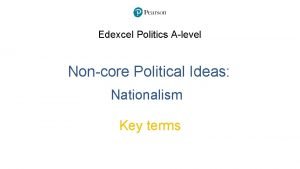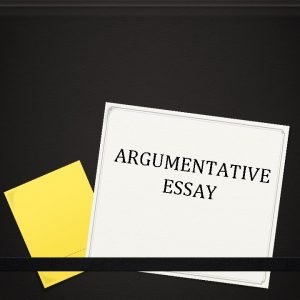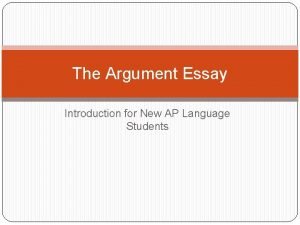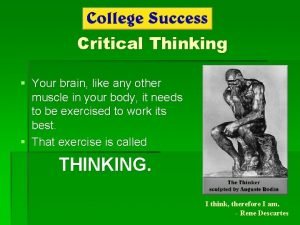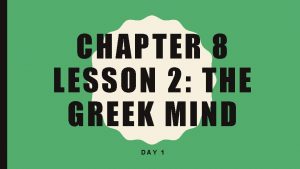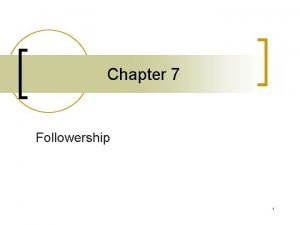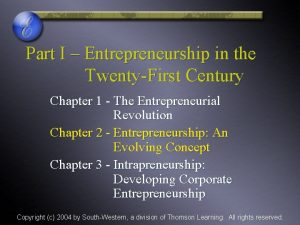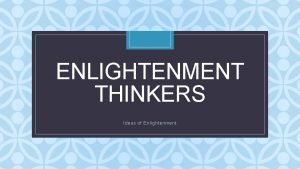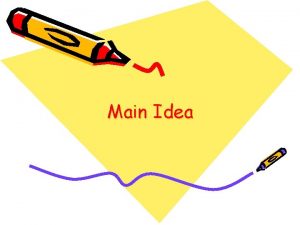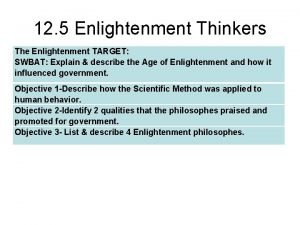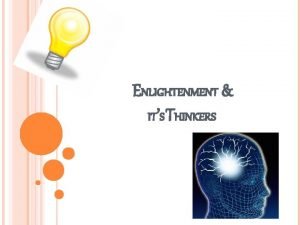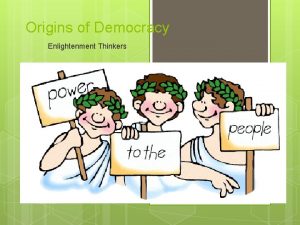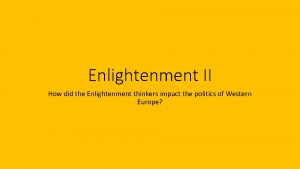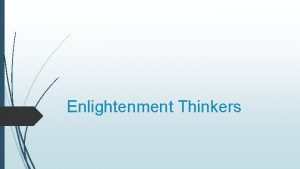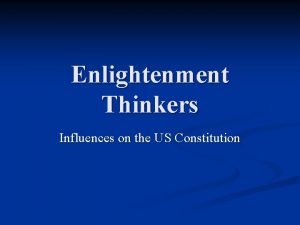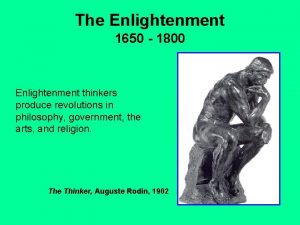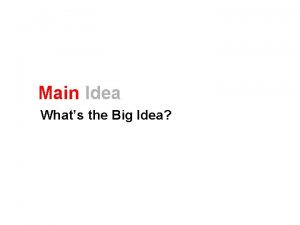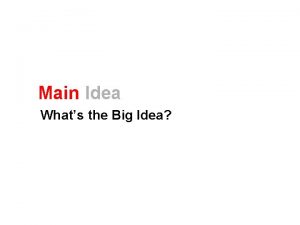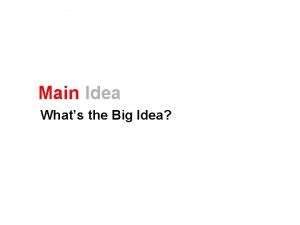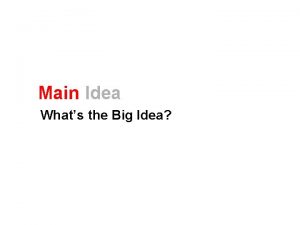Part 2 The Enlightenment Main Idea European thinkers





















- Slides: 21


Part 2 The Enlightenment Main Idea: European thinkers developed new ideas about government and society during the Enlightenment.

Reading Focus � What was the Enlightenment? � How was the Enlightenment influenced by reason? � What new views did philosophers have about government? � What new views did philosophers have about society? � How did Enlightenment ideas spread? � What Role did Salons play in the Enlightenment? � How did the views of Hobbes and Locke about humans in their natural state affect their � � � political ideas? If applied, how would Locke’s economic theory affect taxes? What is Separation of Powers? According to Montesquieu, how was Great Britain’s government an example of separation of powers? Why was Voltaire imprisoned? How did Voltaire express his ideas? What did Mar Wollstonecraft believe about women’s education? What was laissez-faire economics? Who were the enlightened despots? Why did Catherine the Great shift her focus from reform to building a Russian empire? Were the enlightened despots truly enlightened? How might Enlightenment ideas inspire revolutions?

Key Terms and Names �Enlightenment �Salons �Social Contract �John Locke �Jean-Jacques Rousseau �Baron de Montesquieu �Philosophes �Voltaire �Enlightened despots

Objectives � Standard Number: 4. 0 � Governance and Civics Standard: Governance establishes structures of power and authority in order to provide order and stability. Civic efficacy requires understanding rights and responsibilities, ethical behavior, and the role of citizens within their community, nation, and world. � 4. 1 understand the development of major systems of world governance. � 1. 3 understand the ways in which individuals and groups contributed to changes in social conditions. � 5. 11 understand the importance of major trends and movements in world history.

The Age of Reason �Scientific Revolution influenced the power of reason � 1600’s- Philosophers began to view reason as the best way to understand truth. �Enlightenment- Age of Reason �People gathered in coffee houses and public spaces to debate the new ideas. �Books, magazines, and inexpensive pamphlets to spread ideas. �Paris was center of intellectual activity. - Women hosted gatherings called salons bringing together philosophers, artists, scientists, and writers.

Thomas Hobbes � Englishmen � 1651 Leviathan � Experienced violence and upheaval of the English Civil War � Came to believe people were greedy and selfish - “In the natural state, people would lead lives that were solitary, poor, nasty, brutish, and short” - Believed people needed governments to impose order. - Argued that people in a society should agree to give up some freedoms to a strong leader in exchange for the peace, safety, and order that government could provide. - Called this a social contract - Believed that absolute monarchy was the best form of government - Strong, centralized power could be used to impose law and order.

John Locke � English Philosopher � Believed that people were naturally happy, tolerant, and reasonable � Argued that people were born equal with natural rights of life, liberty, and property. � Purpose of government was to protect people’s natural rights. � Believed that monarchs were not chosen by God � People consented to the government, whose power was limited by laws. � If a government failed to protect its citizens’ natural rights, they had the right to overthrow it. - Became foundation for modern democracy.

Two Treatises on Government, 1690 “Those who are united into one body, and have a common established law and judicature {court system} to appeal to, with authority to decide controversies between them, and punish offenders, are in civil society one with another…”

Of the State of Nature. To understand political power right, and derive it from its original, we must consider, what state all men are naturally in, and that is, a state of perfect freedom to order their actions, 5 and dispose of their possessions and persons, as they think fit, within the bounds of the law of nature, without asking leave, or depending upon the will of any other man. 10 A state also of equality, wherein all the power and jurisdiction is reciprocal, no one having more than another; there being nothing more evident, than that creatures of the same species and rank, promiscuously born to all the same advantages of 15 nature, and the use of the same faculties, should also be equal one amongst another without subordination or subjection, unless the lord and master of them all should, by any manifest declaration of his will, set one above another, 20 and confer on him, by an evident and clear appointment, an undoubted right to dominion and sovereignty. Questions: 1. What natural state are men in, according to Locke? 2. What rights do you have in your freedom to do and what restricts you from exercising that right? 3. Who has the power in the natural state? Is it equal? 4. Who has the power to set one man above another? How must that entity do this?

Jean-Jacques Rousseau � Roo-SOH � Believed people were born good � Society corrupted people � Social Contract - “Man is born free but everywhere is in chains. ” � Government should work for the common good, not the wealthy few. - Individuals should give up some of their freedoms for the benefit of the community as a whole. � Despised inequality in society - Believed all people were equal and should be recognized as equal in society.

Baron de Montesquieu � Montesquieu (MOHN-tes- kyoo) � French thinker � Best form of government included a separation of powers. - Dividing power among branches of government would prevent any individual or group from abusing power � 1748 The Spirit of the Laws - Misunderstood how British government operated, but …. - Concept would become the back bone of the United States government.

Voltaire � Francois- Marie Arouet - Wrote under the name Voltaire � Attacked injustice wherever he saw it- among the nobility, government, and in the church. � Imprisoned twice � Exiled to England for two years � Used his pen to defend his principles and to fight superstition and ignorance

Diderot and the Encyclopedia � Denis Diderot (DEE-de-roh) � 1750’s started on his Encyclopedia - 28 volume work explained new ideas about art, science, government, and religion. - 27 years in the making, last volume printed in 1772. � French leaders attacked the work for it criticized the church, the government and the legal system. - 1759 government tries to stop publication - Remainder printed in secret. - Helped spread enlightenment ideals across continents.

Mary Wollstonecraft � Rejected view that women’s roles were as wives and mothers and should only receive as much education as to prepare them for those roles. � Demanded equal rights � A Vindication of the Rights of Woman - argued that if men and women had equal education, they would be equal in society

Adam Smith � Scottish Economists - Used reason to analyze economic systems � 1776 Wealth of Nations � Business should take place in a free market - Strong believer in laissez-faire economics , an economic system that worked without government regulation - Economy would be stronger if the market forces of supply and demand were allowed to work freely.

Enlightened Ideas Spread �Ideas spread quickly through Europe, Prussia, Russia, and beyond - Many appealed directly to Monarchs for change - A few monarchs developed a system in which they governed by enlightened ideas.

Prussia � Frederick II - Believed he was to rule by - absolute power Also influenced by the ideas of Voltaire While building military, also introduced reforms Tried to build an elementary education system for all Prussians Abolished torture Supported religious tolerance (unless you were Jewish) Reduced censorship Opposed serfdom- didn’t abolish it for needed support from aristocracy

Russia � Catherine II -becomes queen in 1762 - Bring order and justice to Russia while supporting education and culture. - Corresponded with Voltaire and Diderot - Russian constitution and code of laws (never put into practice for to liberal) � Initially wanted to free the serfs but did not for she needed the wealthy land owners � Eventually turned into a tyrant

Austria �Most enlightened despot was Joseph II - Eliminated torture and the death penalty - Provided free food and medicine for poor citizens - Granted religious tolerance to protestants and Jews despite being Catholic - Abolished serfdom and required workers to be paid for their work.

Key Enlightenment Ideas �The ability to reason is what makes humans unique. �Reason can be used to solve problems and improve people’s lives. �Reason can free people from ignorance, superstition, and unfair government. �The natural world is governed by laws that can be discovered through reason. �Like the natural world, human behavior is governed by natural laws. �Governments should reflect natural laws and encourage education and debate.
 Stated and implied main idea
Stated and implied main idea What is the enlightenment
What is the enlightenment Baron de montesquieu main ideas
Baron de montesquieu main ideas Enlightenment thinkers chart
Enlightenment thinkers chart Enlightenment thinkers rejected
Enlightenment thinkers rejected Main idea of enlightenment
Main idea of enlightenment Central main idea examples
Central main idea examples Contoh topik dan controlling idea
Contoh topik dan controlling idea What is the difference between topic and theme
What is the difference between topic and theme Topic sentence supporting sentence
Topic sentence supporting sentence How were european rulers guided by enlightenment thought
How were european rulers guided by enlightenment thought Thinkers key
Thinkers key The victorian compromise
The victorian compromise Leonardo bruni beliefs
Leonardo bruni beliefs Nationalism edexcel politics
Nationalism edexcel politics Ntative
Ntative Any list of the greatest
Any list of the greatest For centuries prominent thinkers have pondered
For centuries prominent thinkers have pondered Critical thinkers are movers and shakers
Critical thinkers are movers and shakers Herodotus kruti
Herodotus kruti Uncritical thinking
Uncritical thinking Displacement school of thought
Displacement school of thought

